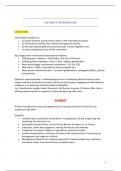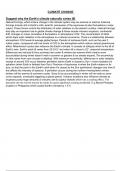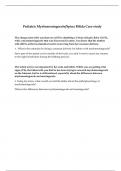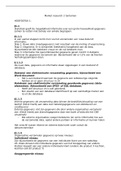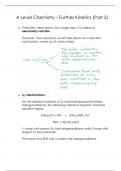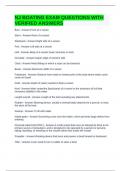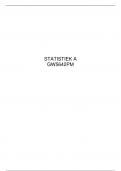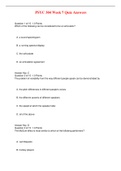LECTURE 1: INTRODUCTION
Lecture notes
International relations as:
• as power relations among nation-states in the international system.
• as international conflict, war, violence and physical security.
• as the international political economy (trade, money, migration etc.)
• as more complicated cross-border interaction.
Big changes have transformed international relations:
• Shifting power relations = USA decline, the rise of China etc.
• Shifting political cleavages = Poor vs Rich, religion, globalisation.
• More and stronger international institutions = EU, UN, G20.
• New actors = NGOs, transnational terror networks etc.
• More porous national borders = Economic globalisation, contagious politics, policies
and practices.
Epistemic superimposition = methodological error of overlaying abstract theories onto
unique historical and political contexts, which can lead to poor engagement with empirical
evidence, or to ignoring empirical evidence altogether.
E.g., Mearsheimer applied realist theories to the Russian invasion of Ukraine after cherry-
picking empirical proofs to support his claim and ignoring other facts.
ACHARYA
IR does not reflect the voices and experiences of societies that aren’t from the core
countries of the West.
Global IR:
• Founded upon a pluralistic universalism: not applying to all but recognising and
respecting the diversity in us.
• Grounded in world history, not just Greco-Roman, European or Us history.
• Subsumes, rather than supplants, existing IR theories and methods.
• Integrates the study of religions, regionalisms, and areas studies.
• Avoids exceptionalism = tendency to present the characteristics of one group as
homogenous and superior to others.
• Recognizes multiple forms of agency beyond the material power (eg. resistance,
normative action, local constructions of global order).
1
, LECTURE 2: REALISM VS IDEALISM
Lecture notes:
Idealism Realism
Role of Power and power- Not usually main or only Most important cause
seeking in IR. politics cause shaping motivations shaping motivations and
and outcomes. outcomes.
Power co-determined by Power mainly determined
material and non-material by material conditions.
conditions (e.g. also (e.g. geography, guns,
ideas/diplomacy). technology)
Goals of IR Analysis Often normative: More ‘positive’-empirical:
To visualize and identify a To reveal what actually
path towards peace, occurs/exists, and why.
democracy, etc.
Makeability/agency Emphasis on Sovereign nation-states
makeability/agency and the international
system
Interests of states Fundamental harmony of Unresolvable clashing of
interests; interests (zero-sum games);
Conflict avoidable Conflict unavoidable
International order Meaningful international Anarchy, absence of
order due to global supranational authority to
institutions and norms make and enforce decisions
(norms and institutions not
important).
2
, Causes of war Undemocratic government; Natural antagonism
irrational or evil leaders; between states under
nationalism, feudalism, anarchy (striving for
militarism, etc. survival/hegemony, where
uncertain power conditions
dangerous)
Political recommendation Spread rule of law and Establish stable and
human rights; create IGOs; transparent power
foster democracy, education equilibrium; concentrate on
and consciousness- limited, ‘vital national
raising interests’
Relationship between Foreign policies strongly Foreign policies mainly
domestic and international influenced by domestic shaped by state’s position in
politics politics (e.g. democratic the international system
versus non-democratic; (less by domestic factors)
character of economy)
Historical torch-bearers Erasmus, Kant, Wilson, Thucydides, Machiavelli,
Gandhi, Von der Leyen (?) Hobbes, Rousseau,
Churchill, Mearsheimer
Contemporary Realism: ‘Primacy of Power’
Realists agree that power and power-seeking = the most important force in IR but differ over
which drivers at which ‘level of analysis’ underlie such power-seeking:
• Is it human nature (‘man’)?: Humans as violent, power-seeking animals
• Is it the nation-state (‘the state’)?: Power and its influence is a function of nation-
states themselves (sovereignty, but also authoritarian rule, offensive doctrine).
• Is it the international system?: Anarchy constrains all states in the international
system to rely on ‘self-help’ for security (through power).
Realism and Power-balancing
‘Power-balancing’ entails the balancing of the increasing (or decreasing) power of other
states.
Realists conceptualize such balancing in varying ways:
• Offensive realism (ex: power-maximizing) vs Defensive realism (ex: power-balancing)
• Internal balancing (e.g. develop army) vs External balancing (e.g. develop alliances)
• Normative (‘power balancing should be pursued’) vs Positive (‘power balancing
occurs naturally’).
Power balancing is universal among states
• Not just between ideological/economic opponents or rivals, but also between
‘friends’ that share norms/institutions/history.
3
, • Not just among old-fashioned Great Powers or militarist nation-states but also
among more ideologically oriented, ‘post-realpolitik’ countries.
Power-balancing creates ‘Security dilemmas’.
• Security dilemma: actions taken by a state to increase its security can lead to
heightened insecurity for other states => higher tensions and conflict.
• Power-politics (e.g. self-help under anarchy) provokes power balancing, such that the
dilemma emerges.
Realism and War
War is a natural, (almost) unavoidable artefact of anarchy, via power-balancing and the
security dilemma.
But war is particularly likely when power-balances are unstable, unclear, misrepresented or
undergoing rapid change.
• E.g., Wars are more frequent between nation-states that are MORE EQUAL.
• E.g., ‘Thucydides Trap’: Wars occur disproportionately in periods of transition in
global or regional power balances.
Realism and Cooperation
In international diplomacy, people seek ‘Relative Gains’ (not just ‘absolute gains’):
• Relative gains strongly constrain ‘choices’: The status of one’s country is judged
relative to the position of other states.
• This yields a natural brake on international cooperation: People are less supportive of
cooperation deals if their gains are outstripped by the gains of the other country.
• BUT seeking ‘relative gains’ can also foster cooperation. E.g. EU post-Ukraine.
Common critiques of realism
• Vague, wrong, and/or incomplete explanations (due to systemic focus on relative
state power).
• Virtually no explanations for power distributions
• Major blind spots towards other IR developments (‘Realism is underdetermining’)
• Reckless recommendations:
• Hobbesian ‘self-fulfilling-prophecies’
Contemporary Idealism: “Possibilities beyond power”
Theoretical traditions
Liberal tradition: International institutions, democracy, economic integration can matter
more than state’s power position in anarchy.
• Liberal international politics emphasises the development and (positive) implications
of international institutions and rule-of-law.
• Liberal domestic politics emphasises the important and positive implications of
mature democracy for peace (at least towards other democracies).
• Liberal economics emphasises the positive implications of mutual economic
dependence, market liberalisation, and economic globalisation.
Marxist tradition (most variants) and ‘Critical-IR’: E.g., Class and production matter more
than a state’s power position’).
4
Lecture notes
International relations as:
• as power relations among nation-states in the international system.
• as international conflict, war, violence and physical security.
• as the international political economy (trade, money, migration etc.)
• as more complicated cross-border interaction.
Big changes have transformed international relations:
• Shifting power relations = USA decline, the rise of China etc.
• Shifting political cleavages = Poor vs Rich, religion, globalisation.
• More and stronger international institutions = EU, UN, G20.
• New actors = NGOs, transnational terror networks etc.
• More porous national borders = Economic globalisation, contagious politics, policies
and practices.
Epistemic superimposition = methodological error of overlaying abstract theories onto
unique historical and political contexts, which can lead to poor engagement with empirical
evidence, or to ignoring empirical evidence altogether.
E.g., Mearsheimer applied realist theories to the Russian invasion of Ukraine after cherry-
picking empirical proofs to support his claim and ignoring other facts.
ACHARYA
IR does not reflect the voices and experiences of societies that aren’t from the core
countries of the West.
Global IR:
• Founded upon a pluralistic universalism: not applying to all but recognising and
respecting the diversity in us.
• Grounded in world history, not just Greco-Roman, European or Us history.
• Subsumes, rather than supplants, existing IR theories and methods.
• Integrates the study of religions, regionalisms, and areas studies.
• Avoids exceptionalism = tendency to present the characteristics of one group as
homogenous and superior to others.
• Recognizes multiple forms of agency beyond the material power (eg. resistance,
normative action, local constructions of global order).
1
, LECTURE 2: REALISM VS IDEALISM
Lecture notes:
Idealism Realism
Role of Power and power- Not usually main or only Most important cause
seeking in IR. politics cause shaping motivations shaping motivations and
and outcomes. outcomes.
Power co-determined by Power mainly determined
material and non-material by material conditions.
conditions (e.g. also (e.g. geography, guns,
ideas/diplomacy). technology)
Goals of IR Analysis Often normative: More ‘positive’-empirical:
To visualize and identify a To reveal what actually
path towards peace, occurs/exists, and why.
democracy, etc.
Makeability/agency Emphasis on Sovereign nation-states
makeability/agency and the international
system
Interests of states Fundamental harmony of Unresolvable clashing of
interests; interests (zero-sum games);
Conflict avoidable Conflict unavoidable
International order Meaningful international Anarchy, absence of
order due to global supranational authority to
institutions and norms make and enforce decisions
(norms and institutions not
important).
2
, Causes of war Undemocratic government; Natural antagonism
irrational or evil leaders; between states under
nationalism, feudalism, anarchy (striving for
militarism, etc. survival/hegemony, where
uncertain power conditions
dangerous)
Political recommendation Spread rule of law and Establish stable and
human rights; create IGOs; transparent power
foster democracy, education equilibrium; concentrate on
and consciousness- limited, ‘vital national
raising interests’
Relationship between Foreign policies strongly Foreign policies mainly
domestic and international influenced by domestic shaped by state’s position in
politics politics (e.g. democratic the international system
versus non-democratic; (less by domestic factors)
character of economy)
Historical torch-bearers Erasmus, Kant, Wilson, Thucydides, Machiavelli,
Gandhi, Von der Leyen (?) Hobbes, Rousseau,
Churchill, Mearsheimer
Contemporary Realism: ‘Primacy of Power’
Realists agree that power and power-seeking = the most important force in IR but differ over
which drivers at which ‘level of analysis’ underlie such power-seeking:
• Is it human nature (‘man’)?: Humans as violent, power-seeking animals
• Is it the nation-state (‘the state’)?: Power and its influence is a function of nation-
states themselves (sovereignty, but also authoritarian rule, offensive doctrine).
• Is it the international system?: Anarchy constrains all states in the international
system to rely on ‘self-help’ for security (through power).
Realism and Power-balancing
‘Power-balancing’ entails the balancing of the increasing (or decreasing) power of other
states.
Realists conceptualize such balancing in varying ways:
• Offensive realism (ex: power-maximizing) vs Defensive realism (ex: power-balancing)
• Internal balancing (e.g. develop army) vs External balancing (e.g. develop alliances)
• Normative (‘power balancing should be pursued’) vs Positive (‘power balancing
occurs naturally’).
Power balancing is universal among states
• Not just between ideological/economic opponents or rivals, but also between
‘friends’ that share norms/institutions/history.
3
, • Not just among old-fashioned Great Powers or militarist nation-states but also
among more ideologically oriented, ‘post-realpolitik’ countries.
Power-balancing creates ‘Security dilemmas’.
• Security dilemma: actions taken by a state to increase its security can lead to
heightened insecurity for other states => higher tensions and conflict.
• Power-politics (e.g. self-help under anarchy) provokes power balancing, such that the
dilemma emerges.
Realism and War
War is a natural, (almost) unavoidable artefact of anarchy, via power-balancing and the
security dilemma.
But war is particularly likely when power-balances are unstable, unclear, misrepresented or
undergoing rapid change.
• E.g., Wars are more frequent between nation-states that are MORE EQUAL.
• E.g., ‘Thucydides Trap’: Wars occur disproportionately in periods of transition in
global or regional power balances.
Realism and Cooperation
In international diplomacy, people seek ‘Relative Gains’ (not just ‘absolute gains’):
• Relative gains strongly constrain ‘choices’: The status of one’s country is judged
relative to the position of other states.
• This yields a natural brake on international cooperation: People are less supportive of
cooperation deals if their gains are outstripped by the gains of the other country.
• BUT seeking ‘relative gains’ can also foster cooperation. E.g. EU post-Ukraine.
Common critiques of realism
• Vague, wrong, and/or incomplete explanations (due to systemic focus on relative
state power).
• Virtually no explanations for power distributions
• Major blind spots towards other IR developments (‘Realism is underdetermining’)
• Reckless recommendations:
• Hobbesian ‘self-fulfilling-prophecies’
Contemporary Idealism: “Possibilities beyond power”
Theoretical traditions
Liberal tradition: International institutions, democracy, economic integration can matter
more than state’s power position in anarchy.
• Liberal international politics emphasises the development and (positive) implications
of international institutions and rule-of-law.
• Liberal domestic politics emphasises the important and positive implications of
mature democracy for peace (at least towards other democracies).
• Liberal economics emphasises the positive implications of mutual economic
dependence, market liberalisation, and economic globalisation.
Marxist tradition (most variants) and ‘Critical-IR’: E.g., Class and production matter more
than a state’s power position’).
4


